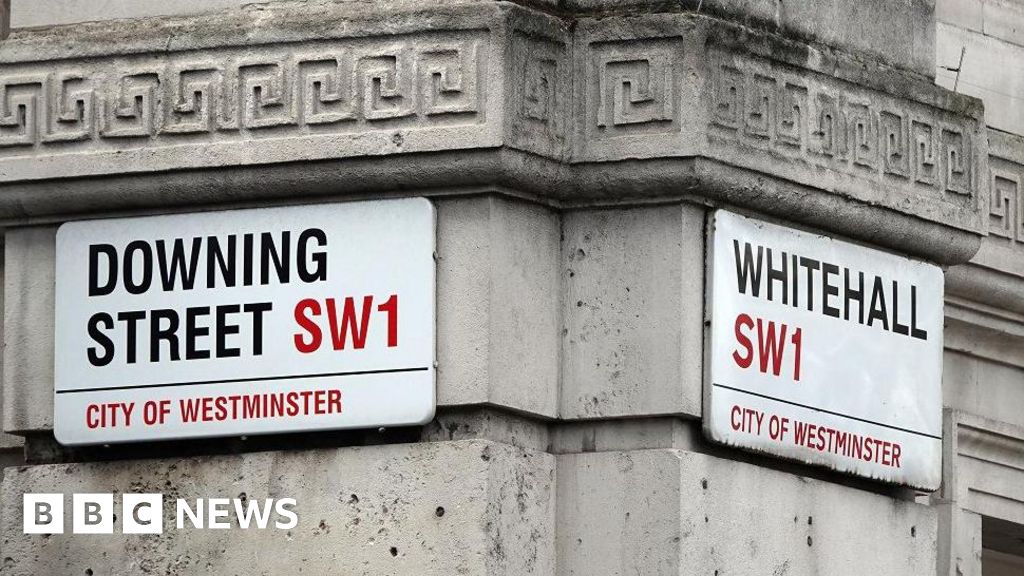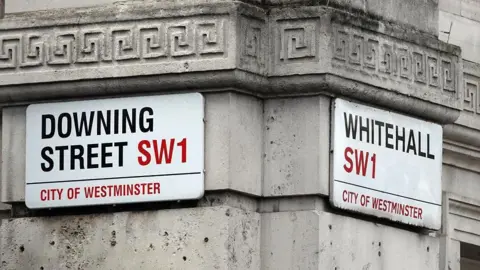
 Getty Images
Getty ImagesThe government is facing questions over the second appointment of someone linked to past Labour donations to a senior civil service post.
Emily Middleton has been appointed Director-General at the Department of Science, Innovation and Technology (DSIT), where Peter Kyle is Minister of State.
She was previously a partner at consultancy Public Digital, which funded her secondment to Mr Kyle’s office for more than £65,000.
The Conservatives described it as a “growing scandal over the appointment of donors to senior civil service positions”.
A government spokesman said the appointment was made “in line with civil service rules on recruitment”.
The Conservatives asked the top civil servant what was known about the donations when Ms Middleton took the job and what role Mr Kyle played in the process.
Separately, Chancellor Rachel Reeves is under pressure to say whether she was involved in the appointment of former banker and Labour donor Ian Corfield as investment director at the Treasury.
In opposition, Labour has repeatedly accused the Conservatives of “cronyism” in appointing their political friends to public bodies.
Downing Street was also contacted for comment on whether the Prime Minister had approved Ms Middleton’s appointment and whether he was aware of donations made to Labour by her former employers.
according to Evidence given by Cabinet Secretary Simon Case to the House of Lords Constitution CommitteeThe Prime Minister shall issue a decision to issue all appointments at the level of the General Directorate and above.
In a letter sent to Mr. Case on July 26, Posted on Friday on XConservative shadow science minister Andrew Griffiths has raised the issue of civil service integrity.
He noted that Ms Middleton’s appointment appeared to set “a new and clear precedent for a minister directly appointing, to a senior civil service position, someone to whom his employer had recently made a large political donation”.
Also on XConservative leadership contender James Cleverly has described Labour’s civil service recruitment practices as “highly questionable”, and has singled out Sue Gray, Sir Keir Starmer’s chief of staff.
“It is funny how a senior civil servant joins the Labour Party, and then a large number of Labour people get civil service appointments!” he wrote.
According to Ms Middleton’s LinkedIn profile, she was “on secondment to the Labour Party advising on digital public service reform” from January to July.
She was previously appointed to work together, a think tank close to Sir Keir.
Her new position at DSIT is General Manager of Digital Centre Design.
Directors-general are among the highest ranks in the civil service, earning salaries ranging from £125,000 to £208,100 a year.
In the cases of Ms Middleton and Mr Corfield, some Conservatives questioned whether the Civil Service Commission, which regulates appointments, was aware of past donations to Labour figures.
But the committee told the BBC that it would not take this issue into consideration.
“Exceptions”
“It’s for [government] “The department will review suitability and background check procedures,” a department spokesperson said.
“Exceptions” to the normal hiring process have been granted more than 100 times in the past 12 months, and can be applied when it comes to external candidates.
Under these circumstances, the Civil Service Commission is focusing on the “business case,” its spokesman said.
“All exceptional appointments are reminded of their responsibilities under the Civil Service Act, outside of work to be impartial, objective, fair and honest,” they previously told the BBC.
There are no rules that automatically prevent someone from being appointed to a civil service position because of a political donation.
The recruitment principles state that the selection committee must ensure that the candidate “understands the requirements of the job objectively and impartially… and must record how this has been done.”
According to Ministerial LawMinisters must “ensure that no conflict arises, or could reasonably be considered to arise, between their public duties and their private interests, financial or otherwise”.
“The decision as to whether action is necessary to avoid conflict or the perception of conflict is the personal responsibility of each Minister, taking into account the advice he has received from his Permanent Secretary and the independent Ministerial Interests Adviser.”

“Travel specialist. Typical social media scholar. Friend of animals everywhere. Freelance zombie ninja. Twitter buff.”






More Stories
Taiwan is preparing to face strong Typhoon Kung-ri
Israel orders residents of Baalbek, eastern Lebanon, to evacuate
Zelensky: North Korean forces are pushing the war with Russia “beyond the borders”